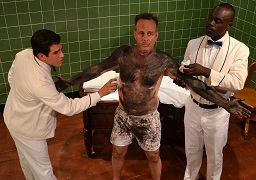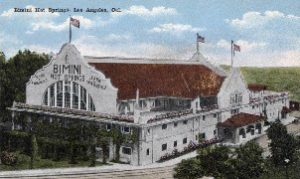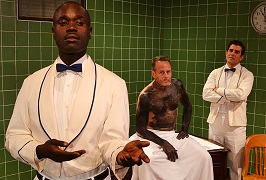
L.A.’s fabled Bimini Hot Springs and Sanitarium (1903-1956) provide the backdrop for Tom Jacobson’s The Ballad of Bimini Baths trilogy, the prolific Angelino playwright’s most ambitious project to date, and if the Playwrights’ Arena World Premiere Tar is any indication of what Plunge and Mexican Day hold in store, audiences are in for an exhilarating, elucidating three-part treat.
A battle of verbal one-upmanship finds Zenobio Remedios (Adrian Gonzalez) pitted against fellow bathing attendant Amen Headley (Noel Arthur) as each attempts to out racial-slur the other, though without ill intent since the storage area where the Mexican-American Zeno and the African-American Amen find themselves undertaking the most bizarre of assignments is a rare safe haven from the racism awaiting them outside the baths in 1939 L.A.
Sharing the storage room with Zeno and Amen on this historic October night (historic because just upstairs Count Basie and his orchestra are performing at the previously white-entertainers-only Palomar Ballroom  ) is the body of a middle-aged drunk fished out of the La Brea Tar Pits whose body the two bath attendants have been assigned the task of wiping clean.
) is the body of a middle-aged drunk fished out of the La Brea Tar Pits whose body the two bath attendants have been assigned the task of wiping clean.
 It’s not too much of a spoiler to reveal that about fifteen minutes into Jacobson’s seventy-minute one-act, the body turns out to belong to the alive and well (but still quite inebriated) Donald Walter (Tim Meinelschmidt).
It’s not too much of a spoiler to reveal that about fifteen minutes into Jacobson’s seventy-minute one-act, the body turns out to belong to the alive and well (but still quite inebriated) Donald Walter (Tim Meinelschmidt).
As to how and why Donald found himself swimming in tar, well let’s just say that the secrets about to be revealed only serve to unscore the racist underbelly of pre-WWII L.A.
 Leave it to the playwright whose 46-character The Chinese Massacre (Annotated) brought late-19th-century Los Angeles to vivid, complex, highly theatrical life to undertake a similarly daunting, three-decade-spanning trilogy with a single historic setting.
Leave it to the playwright whose 46-character The Chinese Massacre (Annotated) brought late-19th-century Los Angeles to vivid, complex, highly theatrical life to undertake a similarly daunting, three-decade-spanning trilogy with a single historic setting.
 Tar’s trio of Angelinos represent a microcosm of race, ethnicity, and culture circa 1939, a time when Mexican-Americans like Zeno were allowed just one day a month to swim in the Bimini Baths (the day when the water was at its dirtiest) and African-Americans like Amen were limited to serving whites (the racial slur “George” had Pullman Porters given their “master” George Pullman’s name) and dared not even think of swimming in a Caucasians-only pool. Even German-American Donald’s support of Hitler’s annexation of Czechoslovakia “to protect the Sudetenland Germans” presages the World War on the horizon and the anti-Axis sentiments he would soon be facing day-to-day.
Tar’s trio of Angelinos represent a microcosm of race, ethnicity, and culture circa 1939, a time when Mexican-Americans like Zeno were allowed just one day a month to swim in the Bimini Baths (the day when the water was at its dirtiest) and African-Americans like Amen were limited to serving whites (the racial slur “George” had Pullman Porters given their “master” George Pullman’s name) and dared not even think of swimming in a Caucasians-only pool. Even German-American Donald’s support of Hitler’s annexation of Czechoslovakia “to protect the Sudetenland Germans” presages the World War on the horizon and the anti-Axis sentiments he would soon be facing day-to-day.
 Under Edgar Landa’s incisive direction, performances could not be finer beginning with Arthur’s commanding star turn as the tale-telling, Shakespeare-quoting wordsmith Amen.
Under Edgar Landa’s incisive direction, performances could not be finer beginning with Arthur’s commanding star turn as the tale-telling, Shakespeare-quoting wordsmith Amen.
Gonzalez’s sweet, sincere, well-meaning Zeno (a character also seen briefly at age 13 in Plunge and as Mexican Day’s 44-year-old protagonist) is a winner too as is Meinelschmidt’s angry, embittered, self-righteous Donald, and Landa once again proves himself a master fight choreographer when push comes to shove.
Indeed only Tar’s overly ambiguous final moments could stand rethinking.
Scenic designer Justin Huen recreates the Baths’ tile-paneled storage room down to its minutest detail (the Palomar Ballroom poster and vintage Dictaphone are nifty touches), Derek Jones and Mylette Nora show off respectively their lighting and costume design gifts, and sound designer Howard Ho mixes effects and ambient sounds with admirable expertise.
Tar is produced by Henry “Heno” Fernandez. Letitia Chang is stage manager. Casting is by Raul Clayton Staggs.
A fascinating glimpse into 20th-century Los Angeles history certain to inspire abundant googling along with an eagerness to complete the trilogy with Son Of Semele’s Plunge and Rogue Machine’s Mexican Day, Tar is Tom Jacobson and Playwrights’ Arena at their L.A.-original best.
Playwrights’ Arena @ Atwater Village Theatre, 3269 Casitas Ave., Atwater Village.
www.playrightsarena.org
–Steven Stanley
June 9, 2018
Production stills: Playwrights’ Arena
Tags: Bimini Baths, Los Angeles Theater Review, Playwrights' Arena, Tom Jacobson



 Since 2007, Steven Stanley's StageSceneLA.com has spotlighted the best in Southern California theater via reviews, interviews, and its annual StageSceneLA Scenies.
Since 2007, Steven Stanley's StageSceneLA.com has spotlighted the best in Southern California theater via reviews, interviews, and its annual StageSceneLA Scenies.







 COPYRIGHT 2025 STEVEN STANLEY :: DESIGN BY
COPYRIGHT 2025 STEVEN STANLEY :: DESIGN BY